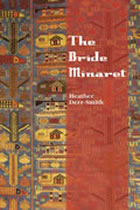
|
In her poem “Mother’s Day,” Heather Derr-Smith approaches the unapproachable: Mothers who kill their children. She asks “(t)he inscrutable question of motherhood: How could she drown all five of them.” But although that question is compelling, the primary focus of The Bride Minaret is found in the final line of “Mother’s Day”—“We are all relieved that there had been signs and symptoms.” In each of its three sections—“Portents,” “Prophecies,” and “Histories”—this book bulges with signs and symptoms. In “Portents” (as with many other poems in this collection), the speaker’s son, Owen, figures prominently. Derr-Smith envisions his future as more bleak than optimistic. She has good reason for holding that attitude, particularly when considering that many of today’s children serve as soldiers in military conflicts around the world. In “Bit,” she anticipates:
In “Gift” and “Tiffany Blues” she suggests that he is more than capable of future violence. He deliberately pushes her Parisian café-au-lait bowl onto the floor, where it breaks. Then, “Happy he broke it, he says, I did it.” Her Tiffany’s box is something that he wants to claim as his own, and she notes that “He wants everything from me” (12). In this case, she reclaims the box and stashes it in a place he cannot reach. Still, he believes that everything belonging to her actually belongs to him. This is a fairly typical attitude in children; however, is it a portent of things to come? Has Derr-Smith been given a sign? Has she seen a symptom? And, having been given warnings, can she circumvent this fate for her son—a fate that has come to fruition with other people and their children in other lands? This is where the “Prophecies” section takes over and explores extreme contrasts between displaced people in the poems and the poet’s own life. Derr-Smith observes the mish-mash of people in “Traffic, Downtown Damascus,” and she speaks of wishes and hopes that remain unfulfilled in “The Girl Named Tents, Tanf Refugee Camp.” In that poem, the girl “was supposed to be a boy, as all girls are.” The reader projects that this girl, one of countless innocents born into horrific lives, is bound to repeat the cycle of horror with her own children. The poet wants to help change terrible circumstances like this one, but she is unable to do so. In “Hit Biscuits,” as with many of the poems, she compares her son’s relatively golden life—“His eyes look up at me while he sucks one nipple/And flicks the other with his finger”—to the lives of two children in Calcutta. Their mother has already chosen one child to die so the other might live. The section ends with “Ash-Sham.” In this poem, “God sees everything”—children, traffic, shopkeepers, vegetation—and hears every prayer offered. Derr-Smith concludes this poem and this section on a troubling note:
After life—Eden? The poet suggests that music, light, water, and breath are essential to achieving happiness or, in this case, paradise. God hears the pleas, knows the sorrow, and understands the needs of the people. What brought the poet to this place in which her own life co-mingles with the lives of people who know only struggle, pain, and heartbreak? We learn of her journey in “Histories,” which explores her youthful connection to (if not agreement with) Pentecostal Christian beliefs. Here is a world of often unspoken expectations that frequently are religion-based. “In three years, Jesus will be here” intones the speaker in “Get Ready.” Sacrifices are demanded—sacrifices that involve observing strict codes of conduct, or else. Or else what? Or else punishments that are meted out in fine doses: “My mother has promised to kill me if, and she meant it (“Witchcraft in Twin Springs”). It is little wonder that the poet retreats from her past and travels back to the Middle East toward the end of the section. In “The Wedding,” she returns to Damascus and a beautiful depiction of the wedding ceremony that eventually melds seamlessly into the poet’s memories of her own wedding. Interestingly, she “cannot remember even one song” from her childhood, which conveys how completely she has left that past life behind. --Pamela R. Anderson Pamela R. Anderson is major gifts fundraiser for WKSU, Kent State University's public radio station. She is a graduate of Hiram College and Kent State University and is now a student in the NEOMFA program. Her poems, articles and reviews have been published in Hobble Creek Review, Penguin Review, Whiskey Island, Kent State Magazine, Dicey Brown, Epitome, and others.
|
